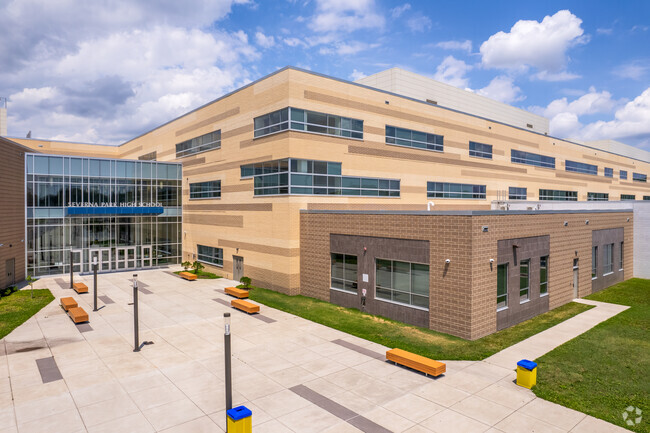Comprehending the Importance of Institutions in Kid Advancement and Community Growth
Schools act as crucial establishments for youngster development and neighborhood growth, offering settings where academic achievements are matched by the growing of social skills and direct exposure to varied perspectives. These academic setups not only advertise critical reasoning and efficient interaction yet also foster compassion with collaborative projects. In addition, institutions' engagement with local areas with service-learning initiatives strengthens the bond between family members and universities. This symbiotic relationship emphasizes the relevance of schools in nurturing energetic citizenship and long-lasting understanding behaviors. What are the particular devices by which these organizations achieve such extensive impacts?
Academic Achievement
Academic success functions as a foundation of child advancement, providing the foundation whereupon future discovering and success are developed. Schools play a pivotal role in fostering this academic development, offering structured environments where children can get essential knowledge and cognitive abilities. Standard educational program guarantee that trainees gain efficiency in core subjects such as mathematics, scientific research, and language arts, which are essential for both higher education and expert possibilities.
In addition to presenting essential academic abilities, colleges also cultivate crucial thinking, analytic capacities, and intellectual curiosity. These cognitive proficiencies are essential for navigating complex real-world scenarios and adapting to the ever-evolving needs of the modern workplace. Teachers, as facilitators of discovering, utilize varied instructional approaches to accommodate varied discovering styles, therefore maximizing specific trainee possibility.
Furthermore, academic success is very closely linked to self-esteem and motivation. Children that experience academic success are more probable to develop a positive self-concept and a long-lasting passion for discovering. Institutions additionally offer different sources, such as libraries and innovation, which even more boost the instructional experience and prepare trainees for a highly advanced culture.
Social Skill Development
Beyond scholastic success, the duty of institutions in social ability development is crucial. Schools work as a key location for youngsters to find out and practice important social skills such as interaction, cooperation, and dispute resolution. In the organized environment of a class, trainees connect with peers, teachers, and various other college team, supplying countless possibilities to develop these vital capabilities.
Efficient social ability advancement in schools is assisted in with team activities, joint jobs, and extracurricular programs. These interactions assist pupils recognize social norms, develop empathy, and cultivate a feeling of community. As an example, team jobs educate pupils just how to work with each other in the direction of an usual goal, listen to various perspectives, and browse disagreements constructively.

The farming of social abilities during college years lays a structure for future individual and specialist relationships. Save Temecula Schools. As students mature, the capability to successfully connect and collaborate becomes progressively vital, underscoring the college's vital function in alternative youngster advancement
Direct Exposure to Variety
Direct exposure to diversity in schools is essential to promoting an inclusive attitude and broadening students' perspectives. Schools function as a microcosm of the broader culture, and experiencing diverse cultures, languages, and socioeconomic histories within this atmosphere gears up trainees with important skills for browsing a progressively globalized world. This direct exposure encourages empathy, decreases bias, and promotes mutual regard among peers.
Study shows that students that communicate informative post with peers from different histories display much better problem-solving abilities and creative thinking. This understanding of variety prepares pupils for future workplaces that value modern skills - Save browse around this web-site Temecula Schools.

Area Engagement
The benefits of diverse class expand past the institution walls, cultivating a strong sense of neighborhood involvement among trainees. By connecting with peers from numerous social, socioeconomic, and ethnic backgrounds, pupils obtain a wider point of view and an admiration for variety. This exposure motivates them to end up being energetic citizens that want to contribute positively to their areas.
Colleges that emphasize community involvement commonly incorporate service-learning tasks, which permit trainees to deal with real-world troubles while using academic abilities. These tasks not just improve students' understanding of their coursework however also impart a sense of duty and compassion. In addition, partnerships in between schools and local organizations provide pupils with chances to get involved in community occasions, better solidifying their role as proactive community participants.
In addition, adult and area involvement in colleges reinforces the bond in between universities and the areas they offer. When colleges open their doors to community events, workshops, and volunteer possibilities, they produce a joint setting that profits all stakeholders. This shared assistance system makes certain that students get alternative advancement, preparing them to become well-rounded individuals that value and contribute to their communities. Via these initiatives, colleges play an essential function in supporting area engagement and fostering social development.
Lifelong Discovering Habits
Developing long-lasting discovering routines is essential for a kid's constant development and versatility in an ever-changing world. Colleges play a critical role in instilling these routines by producing a setting that fosters inquisitiveness, essential thinking, and a love for knowledge. Via varied educational programs and after-school activities, educators motivate trainees to explore numerous subjects, visit this site right here examine details critically, and apply their finding out to real-world circumstances.

Furthermore, institutions give an organized environment where children can develop self-discipline and time administration skills, both of which are crucial for continual knowing. By highlighting the significance of establishing objectives, assessing progress, and adjusting methods, universities prepare pupils to navigate the intricacies of grown-up life, ensuring they remain long-lasting learners and factors to culture.
Final Thought
In verdict, institutions are necessary in promoting youngster growth and neighborhood growth by providing settings helpful to scholastic success, social skill development, and direct exposure to variety. Eventually, institutions grow lifelong learning behaviors, furnishing individuals with the necessary knowledge and skills to contribute favorably to society.
In the structured environment of a class, students engage with peers, teachers, and various other institution staff, using various possibilities to develop these vital capabilities.
In significance, exposure to variety within colleges not only enriches individual trainees yet likewise reinforces the social fabric of the neighborhood as a whole.
The benefits of varied classrooms prolong past the institution wall surfaces, cultivating a solid feeling of community interaction amongst students.Colleges that emphasize neighborhood involvement often integrate service-learning jobs, which permit trainees to resolve real-world problems while applying academic abilities. Partnerships in between schools and regional companies give students with opportunities to get involved in community events, additionally strengthening their duty as aggressive community participants.